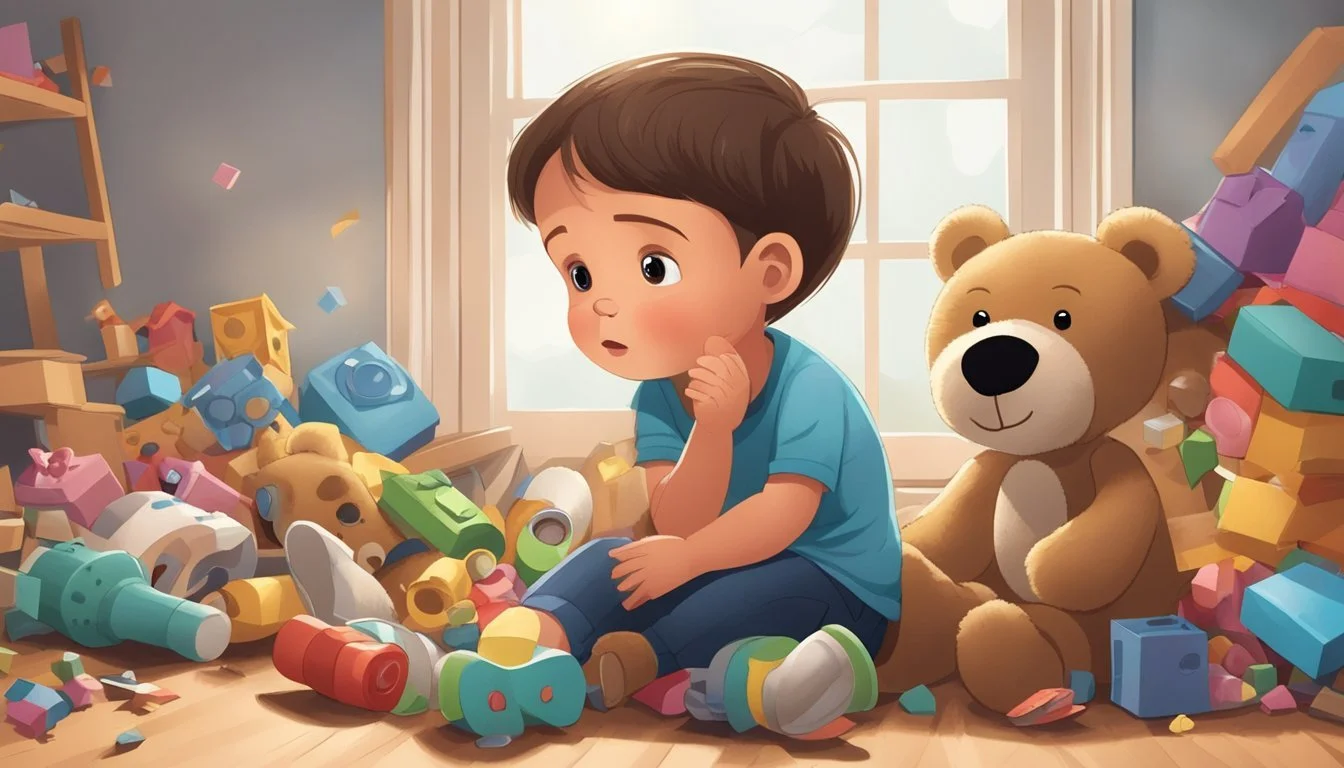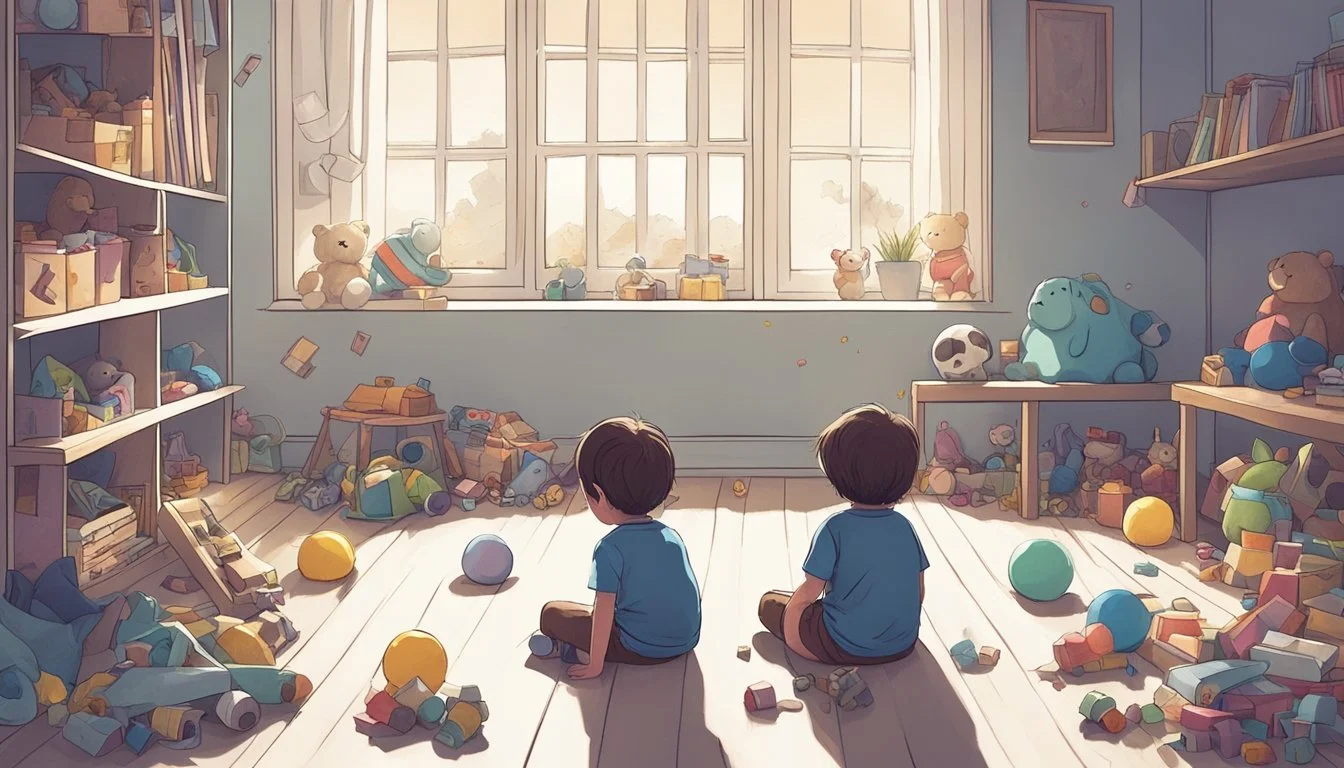Lasting Consequences of Parental Conflict on Child Development
Toxic relationships between parents can have profound and lasting effects on children. Growing up in an environment filled with conflict, tension, and negativity can shape a child's emotional and psychological development in significant ways. Children exposed to toxic parental dynamics often experience increased anxiety, stress, and feelings of insecurity.
Witnessing unhealthy relationship patterns can impact a child's ability to form healthy relationships later in life. They may internalize dysfunctional behaviors and struggle to recognize what constitutes a healthy partnership. This can lead to difficulties in their own future romantic relationships and friendships.
The family unit serves as a crucial foundation for a child's well-being. When toxicity permeates this foundation, it can disrupt a child's sense of safety and stability. Children may develop coping mechanisms to navigate the tumultuous home environment, which can affect their emotional regulation, social skills, and academic performance. Recognizing these potential consequences is essential for parents to prioritize creating a nurturing and supportive family atmosphere.
Understanding Toxic Relationships
Toxic relationships can have severe consequences, especially for children. These harmful dynamics often involve negative patterns of behavior that damage emotional well-being and personal growth.
Defining Toxic Relationships
A toxic relationship is characterized by persistent negative interactions that erode trust, respect, and emotional health. These relationships lack mutual support and often involve one or both partners engaging in harmful behaviors.
Toxicity can manifest in various forms, including verbal abuse, emotional manipulation, and controlling behaviors. In extreme cases, physical violence may occur.
Toxic relationships are not limited to romantic partnerships. They can exist between family members, friends, or colleagues.
Characteristics of Toxic Relationships
Toxic relationships often exhibit several key traits:
Poor communication
Lack of mutual respect
Constant criticism or belittling
Emotional manipulation
Jealousy and possessiveness
Lack of boundaries
Inconsistent or unpredictable behavior
These characteristics create an environment of fear, anxiety, and instability. Partners in toxic relationships may experience low self-esteem, depression, and a sense of powerlessness.
Children exposed to these dynamics can develop long-lasting emotional and behavioral issues.
Toxic Relationship Patterns and Dynamics
Toxic relationships often follow predictable patterns:
Tension building
Outburst or incident
Reconciliation or "honeymoon" phase
Calm before the cycle repeats
This cycle can be difficult to break without intervention. Toxic partners may use manipulation tactics such as gaslighting to maintain control.
Codependency is common in toxic relationships, with one partner excessively relying on the other for emotional support or validation. This dynamic can perpetuate harmful behaviors and make it challenging to leave the relationship.
Recognizing these patterns is crucial for breaking free from toxic relationships and protecting children from their harmful effects.
Psychological Impact on Children
Children exposed to toxic relationships often experience significant psychological effects. These impacts can manifest in various ways, influencing their emotional well-being, ability to form trusting relationships, and long-term mental health.
Emotional and Psychological Well-being
Toxic relationships can severely disrupt a child's emotional stability. Children may experience frequent mood swings, heightened anxiety, and unexplained bouts of sadness or anger. They often struggle to regulate their emotions effectively.
Many develop low self-esteem and feelings of worthlessness. This can lead to difficulties in social interactions and academic performance. Some children may become withdrawn, while others act out aggressively.
Toxic environments can cause children to internalize negative beliefs about themselves and the world around them. This skewed perspective can persist into adulthood if left unaddressed.
Development of Trust and Security Issues
Children in toxic households often struggle to form secure attachments. They may develop trust issues that extend beyond their immediate family.
These trust problems can manifest in various ways:
Difficulty forming close friendships
Reluctance to open up emotionally
Constant fear of abandonment
Excessive neediness or clinginess
Children may also develop a skewed understanding of what constitutes a healthy relationship. This can lead to accepting toxic behaviors as normal in future relationships.
Long-term Mental Health Concerns
Exposure to toxic relationships during childhood can have lasting effects on mental health. Children may be at higher risk for developing:
Depression
Anxiety disorders
Post-traumatic stress disorder (PTSD)
Substance abuse issues
These children often struggle with self-worth and may develop maladaptive coping mechanisms. They might have difficulty maintaining healthy relationships in adulthood.
Without proper intervention, the cycle of toxic behaviors can continue into the next generation. Professional help and supportive environments are crucial for breaking this pattern and promoting healing.
Behavioral Consequences for Children
Children exposed to toxic relationships often experience profound behavioral changes. These alterations can manifest in various ways, impacting their social interactions, emotional regulation, and overall development.
Behavior Problems and Aggression
Children in toxic environments may exhibit increased aggression and behavior problems. They might lash out at peers, siblings, or even adults. Tantrums, defiance, and rule-breaking become more frequent.
Some children internalize their distress, leading to withdrawal or anxiety. Others may struggle with impulse control, acting out in school or social settings. Difficulty concentrating and declining academic performance are common.
These behavior issues often stem from witnessing or experiencing aggression at home. Children learn to use aggression as a coping mechanism or problem-solving tool.
Influence of Parenting and Role Modeling
Parents in toxic relationships inadvertently model unhealthy behaviors. Children absorb these patterns, shaping their understanding of relationships and conflict resolution.
They may learn to use manipulation, guilt, or blame in their own interactions. Empathy development can be stunted, as children focus on self-protection rather than understanding others' feelings.
Fear becomes a driving force in their decision-making. They might struggle to trust others or form secure attachments. This can lead to difficulties in friendships and future romantic relationships.
Development of Unhealthy Behaviors
Exposure to toxic relationships can push children towards unhealthy coping mechanisms. Some may turn to substance abuse to numb their emotions or escape their reality.
Risk-taking behaviors might increase as children seek attention or attempt to assert control over their lives. This can include early sexual activity, reckless driving, or engaging in dangerous stunts.
Self-harm or suicidal thoughts may emerge, especially in older children and teenagers. They might struggle with self-esteem issues, feeling responsible for the family's problems.
Recognizing these behavioral consequences is crucial for early intervention and support. Professional help can guide children towards healthier coping strategies and emotional regulation.
Social and Academic Effects
Toxic relationships can profoundly impact children's social development and academic performance. These effects often manifest in educational settings and interpersonal interactions, shaping a child's ability to learn and connect with others.
Impact on Education and Socialization
Children from toxic home environments may struggle to focus in school. Their academic performance often suffers due to emotional distress and lack of support at home. These students may exhibit disruptive behaviors or withdraw from classroom activities.
Teachers might notice inconsistent attendance or incomplete homework assignments. Some children may seek extra attention from educators to compensate for neglect at home.
Socially, these children may have difficulty making friends. They might display aggressive tendencies or become overly passive in group settings. Trust issues can hinder their ability to form meaningful peer relationships.
Extracurricular activities may be challenging for these students. They might avoid team sports or group projects due to anxiety or fear of rejection.
Challenges in Forming Healthy Relationships
Children exposed to toxic relationships often struggle to understand healthy interpersonal dynamics. They may replicate harmful patterns they've observed at home in their own friendships.
Trust issues are common among these children. They might be overly guarded or, conversely, too quick to trust others. This can lead to difficulties in forming stable, long-term friendships.
Emotional regulation can be a significant challenge. These children may have trouble expressing their feelings appropriately or understanding others' emotions.
Conflict resolution skills are often underdeveloped. They might resort to aggression or avoidance when faced with disagreements, rather than learning to communicate effectively.
Intimacy and closeness can feel threatening to children from toxic environments. They may push others away or become overly clingy in relationships.
Physical Health Implications
Toxic relationships in childhood can have profound effects on physical health. Chronic stress from these dynamics alters physiological processes and increases risks for various health issues. The developing brain is particularly vulnerable to the impacts of relational toxicity.
Links to Physical Health Issues
Children exposed to toxic relationships face heightened risks of cardiovascular problems, weakened immune function, and gastrointestinal disorders. Chronic stress triggers elevated cortisol levels, leading to inflammation and compromised immune responses. This can manifest as frequent illnesses, allergies, and asthma.
Physical abuse within toxic relationships directly harms children's bodies. Injuries may include bruises, fractures, and head trauma. Even without overt violence, neglect can result in malnutrition and stunted growth.
Sleep disturbances are common, impairing physical recovery and development. Headaches, muscle tension, and chronic pain often emerge as stress-related symptoms.
Effects of Stress on the Developing Brain
Toxic stress from unhealthy relationships alters brain structure and function. The hippocampus, crucial for memory and learning, may shrink under prolonged stress exposure. This impacts cognitive abilities and emotional regulation.
The amygdala, responsible for processing emotions, can become overactive. This leads to heightened reactivity to stress and difficulty managing emotions.
Stress also affects the prefrontal cortex, impairing executive functions like decision-making and impulse control. These changes can persist into adulthood, influencing behavior and health outcomes.
Neurochemical imbalances may occur, altering serotonin and dopamine levels. This increases risks for mood disorders and addiction later in life.
Coping Mechanisms and Support Systems
Children exposed to toxic relationships can develop resilience and heal through various coping strategies and support systems. These approaches focus on building emotional strength, accessing professional help, and creating safe environments.
Building Resilience and Emotional Regulation
Resilience is crucial for children to overcome the effects of toxic relationships. Teaching emotional regulation techniques helps children manage their feelings effectively. Mindfulness exercises and deep breathing can calm anxiety and stress.
Encouraging positive self-talk boosts self-esteem and confidence. Role-playing scenarios helps children practice healthy communication and problem-solving skills.
Setting achievable goals and celebrating small victories builds a sense of competence and control. Journaling or art therapy allows safe expression of emotions and experiences.
Importance of Support Groups and Therapy
Professional help is invaluable for children healing from toxic relationships. Individual therapy provides a safe space to process experiences and learn coping skills. Cognitive-behavioral therapy (CBT) can be particularly effective in addressing negative thought patterns.
Support groups connect children with peers facing similar challenges, reducing feelings of isolation. Group therapy sessions teach valuable social skills and empathy.
Family therapy can improve communication and relationship dynamics within the home. Play therapy is often beneficial for younger children who struggle to verbalize their feelings.
Creating a Safe and Stable Environment
Establishing a consistent routine provides a sense of normalcy and security for children. Clear, age-appropriate boundaries help children feel safe and understood.
Creating a "safe space" at home where children can retreat when feeling overwhelmed is important. This area should be comforting and free from triggers.
Encouraging healthy relationships with trusted adults outside the family can provide additional support. Teachers, coaches, or mentors can offer guidance and stability.
Regular check-ins about feelings and experiences show children their emotional well-being is valued. Developing a safety plan with trusted adults helps children feel prepared and empowered in difficult situations.
Navigating Family Dynamics and Separation
Family separation profoundly impacts children's wellbeing and development. Navigating the changes requires careful consideration of custody arrangements, parenting approaches, and financial stability.
Effects of Divorce and Custody Arrangements
Divorce disrupts children's sense of security and routine. Custody arrangements play a crucial role in minimizing negative impacts. Joint custody often provides children with continued access to both parents, supporting emotional stability.
However, high-conflict divorces can increase children's anxiety and stress levels. Exposure to parental arguments or being caught in the middle can harm self-esteem and social relationships.
Courts prioritize the best interests of the child when determining custody. Factors considered include each parent's ability to provide care, the child's relationship with each parent, and any history of domestic violence.
Transition to Single Parenting and Co-parenting
Single parenting presents unique challenges. The primary caregiver may face increased stress and responsibilities. This can impact their ability to provide consistent emotional support and discipline.
Co-parenting requires clear communication and cooperation between ex-partners. Successful co-parenting minimizes conflict and maintains a united front on important decisions regarding the child's upbringing.
Establishing new family routines helps children adjust. Consistent schedules across households provide a sense of stability. Encouraging open dialogue allows children to express their feelings about the changes.
Financial Stability and Housing Concerns
Divorce often leads to financial strain for both parents. Reduced household income can limit access to resources and opportunities for children. Child support payments aim to maintain the child's standard of living.
Housing instability is a common concern. Children may need to move homes or schools, disrupting their social networks. This can increase feelings of insecurity and anxiety.
Financial planning is crucial for single parents. Budgeting, seeking additional income sources, and utilizing community resources can help maintain stability. Some families benefit from consulting a financial advisor or family therapist to navigate these challenges.
Professional Guidance and Intervention
Seeking expert help is crucial for children affected by toxic relationships. Mental health professionals, legal experts, and community resources play vital roles in providing support and facilitating healing.
The Role of Mental Health Professionals
Mental health professionals offer essential support for children exposed to toxic relationships. Therapists specializing in child psychology can help kids process traumatic experiences and develop healthy coping mechanisms. These experts employ various therapeutic approaches tailored to each child's needs.
Cognitive-behavioral therapy (CBT) is often used to address negative thought patterns and behaviors. Play therapy allows younger children to express themselves through toys and games. Family therapy may be recommended to improve communication and relationships within the household.
Therapists also focus on building resilience and emotion regulation skills. They work with children to identify and manage their feelings, fostering emotional intelligence and self-awareness.
Legal and Therapeutic Interventions
Legal interventions can be necessary to protect children from harmful environments. Family courts may issue restraining orders or modify custody arrangements to ensure child safety. Child protective services may intervene in severe cases of abuse or neglect.
Therapeutic interventions often work alongside legal measures. Trauma-focused cognitive-behavioral therapy (TF-CBT) is an evidence-based treatment for children who have experienced abuse or witnessed violence. This approach helps children process traumatic memories and develop coping strategies.
Group therapy sessions can provide a supportive environment for children to share experiences with peers facing similar challenges. These sessions help reduce feelings of isolation and foster a sense of community.
Education and Community Resources
Education plays a crucial role in addressing toxic relationship effects on children. Schools can implement programs that teach students about healthy relationships and emotional intelligence. These initiatives help children recognize warning signs of abuse and develop positive communication skills.
Community resources offer additional support:
Support groups for children and families
Domestic violence shelters
Parenting classes focused on positive discipline techniques
After-school programs promoting social-emotional learning
The American Academy of Pediatrics recommends routine screening for adverse childhood experiences (ACEs) during pediatric visits. This approach helps identify at-risk children early and connect families with appropriate resources.
Local mental health clinics and non-profit organizations often provide sliding-scale fees or free services for families in need. These resources ensure that professional help is accessible to children from various socioeconomic backgrounds.






